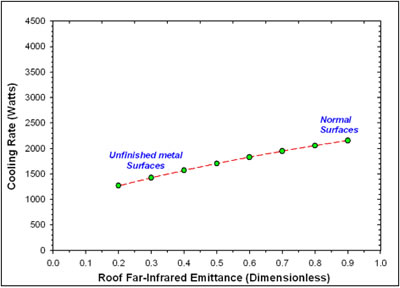Emittance of metal roofing varies with the surface finish.
Infrared emittence of steel roof.
Painted finishes often maintain a lower emittance value than bare metal products.
They can also reduce the urban heat island effect.
Emittance of metal roofing varies with the surface finish.
Where annual cooling loads dominate a highly reflective and emissive painted metal roof is optimal for.
Where annual cooling loads dominate a highly reflective and highly emissive.
With the exception of a metallic surface most roofing materials can have emittance values above 0 85 85.
Therefore they would not be good materials for cool roofs.
Metal roofs with oven cured pre painted organic coatings that incorporate new cool pigment technology offer high total solar reflectance and high infrared emittance even with darker colors.
However emittance also matters because the higher the emittance the more readily the roof surface will radiate long wave ir heat to the sky.
Shiny metal roofs can have a relatively high solar reflectance upwards of 0 60 but they tend to have low thermal emittances which can make them as hot as dark roofs.
The infrared emittance of a roof is a measure of absorbed solar radiation that is remitted from the roof surface to the sky.
Emittance of painted metal roofing can be as high as 90.
One example is a metal wrench left.
Cool roofs are roofing systems which create a higher solar reflectance and thermal emittance when compared to other roofing products.
Solar reflective index sri.
Emittance of painted or granular coated metal roofing can be as high as 90 percent.
In terms of how cool roofs work solar reflectance is a process in which a roof reflects the sun s uv and infrared rays and thermal emittance refers to a roof s ability to radiate absorbed non reflected.
The emittance of a material refers to its ability to release absorbed heat.
Emissivity as high as 90 can be achieved for painted and granular coated roofing.
New infrared reflective pigments incorporated into paints used on architectural metal roofing products allow them to achieve higher reflectivity values even in darker colors such as black and brown.
Scientists use a number between 0 and 1 or 0 and 100 to express emittance.
Infrared emittance e infrared emittance also referred to as thermal emittance is rated between 0 and 1 and rates the ability of a product to cool itself by releasing thermal radiation back into the atmosphere.
Today though critics of metal roofs often use the title of the pulitzer prize winning play as an argument to dispel the notion that metal roofing can be cool and energy efficient.

